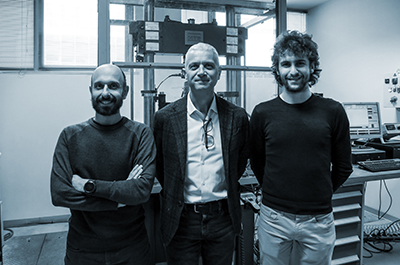
The Smart-ProFACE project, headed by the research group of Prof. Stefano Beretta, has won the ESA tender "SMART, RELIABLE AND COST-EFFECTIVE MANUFACTURING AND FATIGUE VERIFICATION OF MISSION CRITICAL STRUCTURAL ITEMS ".
The main objective by ESA was to identify, down-select, further develop and demonstrate promising combinations of relatively mature, state of art smart AM printing processes (already targeted for space, automotive, aircraft) and novel verification methodologies to produce cost-effective high cycle fatigue and mission critical metallic structural items, with reduced cost/development time and increased design freedom.
The proposed approach to reach the main objective of the tender is to set up a new fatigue assessment procedure based on a new feature of ProFACE, the probabilistic fatigue software post-processor developed at PoliMI that was already benchmarked on an AlSi10Mg component and delivered to ESA.
The new concept for a quick fatigue assessment will be based on the definition of defect acceptance maps: i) maps based on the deterministic (or semi-probabilistic) requirements of the standards; ii) acceptance maps defined on a user-defined failure probability. The two types of maps will then become a new tool (either deterministic or fully probabilistic) for design (in relation to inherent process anomalies) and for post-processing either 'smart manufacturing' data (coming from the AM which adopts OM- Online Monitoring) or NDE data (XCT). The maps elaborated by Smart- ProFACE will also become a tool for qualification and fast flight clearance of AM manufactured parts because they will convey, in a simpler interface, the full probabilistic analyses.
A key aspect will be the verification of the smart-ProFACE approach for two prospective types of data (OM or XCT). This verification will be performed independently by testing two breadboards (from TAS-F and Leonardo), manufactured in Ti6Al4V and Scalmalloy, with deliberately incorporated defects.
The general flow of the activity is shown in Figure 1. In the initial phase, material tests (tensile, fatigue and XCT) will be performed according to the ECSS standard to obtain process signature data and generate ProFACE predictions, to be confirmed by breadboard tests. In the second phase, defective components will be manufactured and OM, XCT used to detect part anomalies. Smart-ProFACE will incorporate new tools (deterministic and probabilistic defect acceptance maps for a target life) and the defective components then tested under fatigue to confirm the predictions. MTC will use smart manufacturing, applying OM, to make Ti6Al4V components which will be tested by Leonardo, Scalmalloy component will be printed and inspected (XCT) by BEAMIT and then tested by TAS-F.
The consortium partners have the experience, skills and competences needed for this challenging project.
- PoliMI (research group of Prof. Beretta) developed ProFACE and they will use this unrivalled experience to lead this project, taking care of software development, material testing and validation;
- MTC has outstanding AM capability and has already cooperated closely with PoliMI for CoO1 and CoO5. MTC has significant experience in L-PBF, including the application of in-process monitoring and the generation and characterisation of artificial defects.
- BEAMIT is one of the largest 3D printing companies in the world and they have a long experience of R&D activities with PoliMI and Leonardo for component design and fatigue properties of AM materials;
- TAS-F has participated to the development of ECSS standards and they have a long experience in design of space components considering building blocks for family of components, the typical properties of AM materials and their qualification;
- Leonardo has a long experience in developing instruments for space missions and their qualification according to ECSS standards.
The research group of DMEC will take care of:
- project direction;
- development of the new fatigue assessment procedure;
- material testing;
- analysis of component tests and comparison with the expected outputs;
- suggestion of improvement of ECSS standards.
